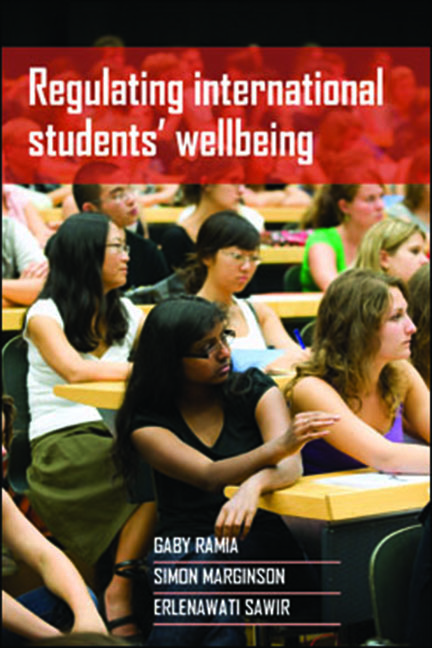Book contents
- Frontmatter
- Contents
- List of figures and tables
- Acknowledgements
- Preface
- one Introduction: global students and their discontents
- two Governing globalisation? National regulation and international student wellbeing
- three Fast growing, diverse: mapping the business of international education
- four ‘There’s gold in them thar students!’ Australia and New Zealand in the global market
- five Much regulation, minimal protection: the Australian model
- six Pastoral care, minimal information: the New Zealand model
- seven Different frameworks, similar outcomes: comparing Australia and New Zealand
- eight Doing it differently: national and global re-regulation and trans-national student citizens
- nine Conclusion
- References
- Index
eight - Doing it differently: national and global re-regulation and trans-national student citizens
Published online by Cambridge University Press: 03 February 2022
- Frontmatter
- Contents
- List of figures and tables
- Acknowledgements
- Preface
- one Introduction: global students and their discontents
- two Governing globalisation? National regulation and international student wellbeing
- three Fast growing, diverse: mapping the business of international education
- four ‘There’s gold in them thar students!’ Australia and New Zealand in the global market
- five Much regulation, minimal protection: the Australian model
- six Pastoral care, minimal information: the New Zealand model
- seven Different frameworks, similar outcomes: comparing Australia and New Zealand
- eight Doing it differently: national and global re-regulation and trans-national student citizens
- nine Conclusion
- References
- Index
Summary
What are the prospects for regulation in Australia and New Zealand from this point? What needs to be done at the national level and what are the possibilities in the trans-national arena? With student and staff interview data in respect of each regime effectively working against the idea that the two are substantively different to each other in terms of the welfare impact of formal regulation, whether national regulation ‘matters’ is an important question. On the other hand, similarity of comparative outcomes increases the likely utility of similar re-regulation. The comparative reform project is, in practice, made easier if the outcomes, actual and desired, are similar in the two countries. As argued here, however, in principle a fundamental additional consideration is that the national context cannot be fruitfully reformed without simultaneous attention to levels above and beyond the ambit of the nation-state. The trans-national and the global arenas are called into play.
Formal regulation in the trans-national sphere shows the potential to have an impact on the national, but it is yet to be comprehensively tested because the conduct of so few nations has been substantively affected by it when it comes to education. The central global instrument designed to free up trade and create global convergence in international education regulation, the WTO's GATS, is almost (although not quite) significant if assessed by the number of signatories. Yet the number of countries whose activities are meaningfully affected or amended by it is small. The scope for informal regulation is a more interesting and fruitful question because it has greater potential to teach researchers and regulators lessons geared towards enhanced student welfare.
Given the need for reform at the national level, and the inability of Australian and New Zealand regulators to meaningfully provide welfare through existing means – at least not without the revamped political will of all regulatory agents including students themselves – this chapter argues that re-regulation should encompass a combination of revised national arrangements leading towards a national student citizenship. Due to the absence of a citizenship agenda, this involves a major re-conception of the status of international students. Importantly, however, in addition the analysis calls for a fresh vision of the transnational aspects of that citizenship.
- Type
- Chapter
- Information
- Regulating International Students’ Wellbeing , pp. 137 - 154Publisher: Bristol University PressPrint publication year: 2013

